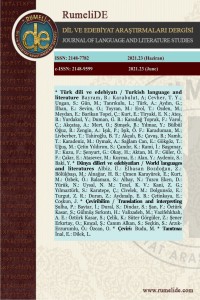Abstract
Bu çalışmada kamping, kanyon, kargo, kateter, komodor, kompleks, konteyner ve kovboy sözcüklerinin köken tespiti ele alınmaktadır. Bundan dolayı öncelikle söz konusu sözcüklerle ilgili birtakım sözlüklerdeki yazılanlara bakılmış, köken verileri gözden geçirilmiştir. Ardından bu sözcüklerin çeşitli Türkçe sözlüklerde bulunan köken ve anlam bilgileri yazılmıştır. Köken konusunda verilen bilgilerde farklılıklar tespit edildiğinde ilgili yabancı sözlüklerdeki İngilizce ve Fransızca anlamları, çevirileri de yapılarak birlikte verilmiştir. Ayrıca bahsedilen sözcüklerin kaynak dildeki ve gerekli görülen yabancı dillerdeki telaffuz biçimleri gösterilmiş, bunlar Türkçedeki telaffuz biçimleriyle karşılaştırılmıştır. Bu sözcüklerin taranan sözlüklerde bulunup bulunmamalarına göre tarihî veriler elde edilmiştir. Türkçe ve İngilizce, Fransızca gibi yabancı kaynaklarda geçen tarihî verilerin yanı sıra anlam bilimsel ve ses bilimsel veriler de dikkate alınmıştır. Böylelikle kamping, kanyon, kargo, kateter, komodor, kompleks, konteyner ve kovboy sözcüklerinin Türkçeye hangi dillerden alıntılandıklarının doğru tespit edilmesi amaçlanmıştır. Bu çalışmada araştırılan kamping, kanyon, kargo, kateter, komodor, kompleks, konteyner ve kovboy sözcüklerinin kökenleri açısından bazen bazı Türkçe sözlüklerin aynı görüşte olup ortak noktada buluştukları, bazen de birbirinden farklı görüşler belirttikleri fark edilmiştir. Bundan dolayı adı geçen sözcüklerin kökenleri hakkındaki görüşlerimizin kimi zaman birtakım sözlüklerle aynı doğrultuda olduğu, kimi zaman da diğer bazı sözlüklerden farklı olduğu sonucuna ulaşılmıştır. Tarihî, anlam bilimsel ve ses bilimsel veriler sayesinde bunların nedenleri açıklanmıştır.
References
- Ayverdi, İ. (2011). Misalli büyük Türkçe sözlük. İstanbul: Kubbealtı.
- Hornby, A. S. (2015). Oxford advanced learner’s dictionary. Oxford: Oxford University.
- Karaağaç, G. (2015). Türkçenin alıntılar sözlüğü. Ankara: Akçağ.
- Meninski, F. (2000). Thesaurus linguarum orientalium Turcicae-Arabicae-Persicae: Lexicon Turcico-Arabico-Persicum (haz. Mehmet Ölmez). İstanbul: Simurg.
- Redhouse, J. W. (1987). A Turkish and English lexicon: shewing in English the significations of the Turkish terms. Beirut: Librairie du Liban.
- Robert, P. (2001). Le grand Robert de la langue française. Paris: Dictionnaires Le Robert.
- Saraç, T. (2003). Büyük Fransızca-Türkçe sözlük: Grand dictionnaire Français-Turc. İstanbul: Adam.
- Şemseddin Sâmi. (2002). Kâmûs-ı Türkî. İstanbul: Çağrı.
- Türkçe sözlük. (1944). İstanbul: Cumhuriyet.
- Türkçe sözlük. (2011). Ankara: Türk Dil Kurumu.
- Türkçede Batı kökenli kelimeler sözlüğü. (2015). Ankara: Türk Dil Kurumu.
- Webster, N. (1996). Webster’s encyclopedic unabridged dictionary of the English language. New York: Random House Value.
Abstract
In this study, the origin determination of the words kamping, kanyon, kargo, kateter, komodor, kompleks, konteyner and kovboy is examined. For this reason, first of all, what is written in some dictionaries about the words in question was looked at, and their origin data were reviewed. Subsequently, the origins and meanings of these words in various Turkish dictionaries were written. When differences were observed in the information given about the origin, the English and French meanings in the relevant foreign dictionaries were also translated and given together. In addition, the pronunciation forms of the mentioned words in the source language and in foreign languages that were deemed necessary were shown, and these were compared with the pronunciation forms in Turkish. Historical data were obtained according to whether these words were found in the scanned dictionaries or not. In addition to historical data in Turkish and foreign sources such as English and French, semantic and phonological data were also taken into consideration. In this way, it is aimed to correctly detect from which languages the words kamping, kanyon, kargo, kateter, komodor, kompleks, konteyner and kovboy were loaned to Turkish. In terms of the origins of the words kamping, kanyon, kargo, kateter, komodor, kompleks, konteyner and kovboy, which were investigated in this study, it was noticed that sometimes some Turkish dictionaries agree and meet at a common point, and sometimes express different opinions from each other. Therefore, it has been concluded that our views about the origins of the words mentioned are sometimes in line with some dictionaries and sometimes different from some other dictionaries. Their reasons have been explained with the help of historical, semantic and phonological data.
References
- Ayverdi, İ. (2011). Misalli büyük Türkçe sözlük. İstanbul: Kubbealtı.
- Hornby, A. S. (2015). Oxford advanced learner’s dictionary. Oxford: Oxford University.
- Karaağaç, G. (2015). Türkçenin alıntılar sözlüğü. Ankara: Akçağ.
- Meninski, F. (2000). Thesaurus linguarum orientalium Turcicae-Arabicae-Persicae: Lexicon Turcico-Arabico-Persicum (haz. Mehmet Ölmez). İstanbul: Simurg.
- Redhouse, J. W. (1987). A Turkish and English lexicon: shewing in English the significations of the Turkish terms. Beirut: Librairie du Liban.
- Robert, P. (2001). Le grand Robert de la langue française. Paris: Dictionnaires Le Robert.
- Saraç, T. (2003). Büyük Fransızca-Türkçe sözlük: Grand dictionnaire Français-Turc. İstanbul: Adam.
- Şemseddin Sâmi. (2002). Kâmûs-ı Türkî. İstanbul: Çağrı.
- Türkçe sözlük. (1944). İstanbul: Cumhuriyet.
- Türkçe sözlük. (2011). Ankara: Türk Dil Kurumu.
- Türkçede Batı kökenli kelimeler sözlüğü. (2015). Ankara: Türk Dil Kurumu.
- Webster, N. (1996). Webster’s encyclopedic unabridged dictionary of the English language. New York: Random House Value.
Details
| Primary Language | Turkish |
|---|---|
| Subjects | Linguistics |
| Journal Section | Turkish language, culture and literature |
| Authors | |
| Publication Date | June 21, 2021 |
| Published in Issue | Year 2021 Issue: 23 |


